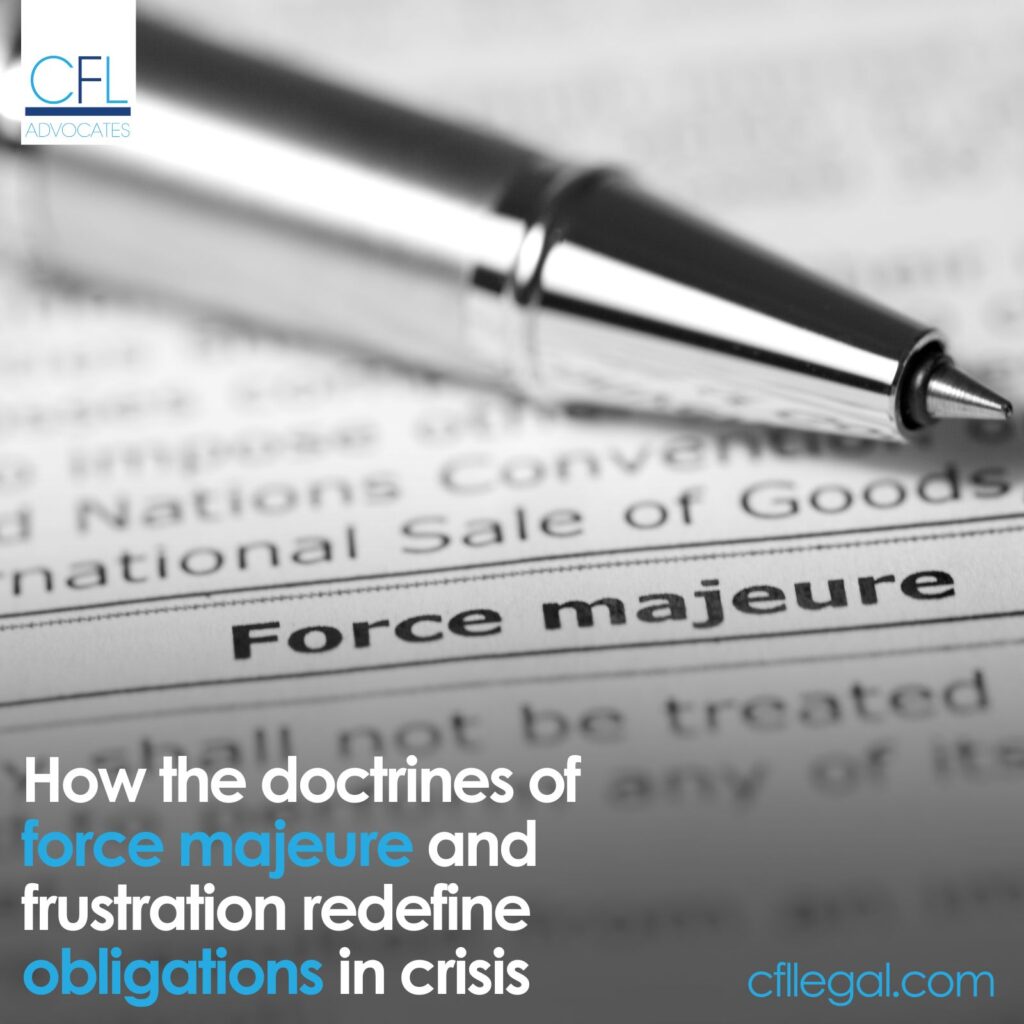
In recent years, the legal and commercial relevance of force majeure clauses has been thrust into the spotlight, particularly during global crises such as the COVID-19 pandemic, political unrest and natural disasters. This compelled courts around the world to address the difficult topic of how legal systems ought to categorize the pandemic’s impact on contractual obligations. This question is centered on the conflict between two different doctrines: frustration and force majeure.
Force Majeure versus Frustration
In the realm of contract law, the two principal doctrines of force majeure and frustration are often invoked to excuse parties from fulfilling their contractual obligations when unforeseen events render performance impossible or impracticable.
A clear understanding of both doctrines is essential in navigating the legal and commercial implications of extraordinary global events such as the COVID-19 pandemic that challenge the stability and enforceability of contractual relationships.
Force majeure is applied only where expressly provided for within the contract and is triggered by specific, enumerated events beyond the parties’ control. These events may include:
- Natural disasters (floods, droughts, wildfires, earthquakes)
- Wars or terrorism
- Pandemics or epidemics
- Strikes or industrial action
- Government restrictions or changes in law
Frustration, on the other hand is a principle of common law that automatically applies where an unforeseen event fundamentally alters the nature of the contract, making performance impossible or radically different from what was contemplated. To successfully invoke the doctrine of frustration the following criteria must be satisfied:
- The event must render performance objectively impossible and where the subject matter is destroyed.
- The event must occur without fault on the part of the party seeking to rely on it.
- The event must transform the nature of the contract so significantly that performance would no longer resemble what was originally agreed upon.
Courts apply Frustration doctrine with great caution especially during crisis such as the Covid-19 pandemic. This was emphasized by the Supreme Court in Kwanza Estates Limited v Jomo Kenyatta University of Agriculture and Technology [2024] KESC 74 (KLR). In this case, Jomo Kenyatta University of Agriculture and Technology (JKUAT) contended that the COVID-19 pandemic had frustrated its lease agreement with Kwanza Estates Ltd. The university cited government-imposed lockdowns, severe financial strain and widespread disruption in the education sector as factors that made continued performance of its obligations impossible. JKUAT argued that these unforeseen circumstances fundamentally altered the nature of the contract, thereby rendering further compliance untenable under the doctrine of frustration. The Supreme Court held that financial hardship alone, even one stemming from an extraordinary event like the Covid-19 pandemic, does not automatically discharge a tenant’s rental obligations. The Covid-19 pandemic was thus held not to constitute a frustrating event that would allow JKUAT to be discharged from further performance under the lease. Regarding the issue of force majeure, the Court observed that the lease agreement contained no express force majeure clause. As a result, the Court rejected the doctrine as a valid defense. It emphasized that force majeure is a contractual mechanism that must be explicitly provided for within the terms of the agreement. In the absence of such a clause, the Court held that the parties could not rely on force majeure to excuse non-performance.
The case above underscores the strict application of the doctrine of frustration and the limited reach of force majeure. It exposed a critical gap in legal protection when contracts do not expressly provide for extraordinary disruptions. It further illustrates the need for common law jurisdictions such as Kenya to consider recognizing implied force majeure principles in circumstances where unforeseen events such as the COVID-19 pandemic in the absence of an express contractual clause.
Conclusion
The COVID-19 pandemic laid bare the limitations of traditional contract law, revealing that doctrines such as force majeure and frustration often fall short in addressing the complexities of modern global crises. In an increasingly interconnected world, where unexpected disruptions are becoming more frequent and far-reaching, the demand for greater adaptability in contract law has never been more urgent. Recognizing an implied force majeure principle presents a pragmatic and balanced solution one that allows commercial parties to seek reasonable relief from unforeseeable events while preserving commercial certainty. By embracing such an approach, contract law can evolve into a framework that is not only legally sound but also fair, flexible and responsive to the realities of a rapidly changing world.


